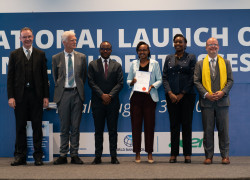PwC Luxembourg - Trade repositories authorised
Countdown to EMIR reporting begins
Firms only have a few weeks to get to grips with this new regulation and there are significant risks to being late. It may seem fairly straightforward, but the extent of the data required is troubling many in the market and experience shows that it doesn’t take much to get this reporting wrong, with significant consequences
Lionel Nicolas, Consulting partner at PwC Luxembourg
The ESMA announced that the first trade repositories have been authorised under the European Market and Infrastructure Regulation (EMIR) on 7 November. This means that the EMIR reporting obligation for all derivative contracts will start on 12 February 2014.
As a result, any derivative counterparty in the European Economic Area (EEA) that is subject to EMIR, including corporates and other unregulated market participants, will be required to provide specific reports for transactions in all derivative asset classes (i.e. interest rates, foreign exchange, equity, credit and commodities) and for both over-the-counter (OTC) and exchange-traded derivatives.
“The new reporting obligation will require substantially more detailed information than regulated firms are currently reporting to their local regulators, including the CSSF in Luxembourg, said Olivier Carré, Regulatory Compliance Advisory Services partner at PwC Luxembourg. Corporates and unregulated counterparties which currently have no specific regulatory reporting obligations must build or delegate reporting to Trade Repositories to meet this new requirement.”
“Firms only have a few weeks to get to grips with this new regulation and there are significant risks to being late. It may seem fairly straightforward, but the extent of the data required is troubling many in the market and experience shows that it doesn’t take much to get this reporting wrong, with significant consequences, said Lionel Nicolas, Consulting partner at PwC Luxembourg. We have to consider the obligation to report the so-called backlog trades. This includes all contracts outstanding on 16 August 2012 or concluded afterwards, even if they had been terminated before the reporting starting date.”
Data collection, data accuracy, compliance with reporting deadlines (i.e. each transaction has to be reported within the following business day it is concluded, modified or terminated) are the main challenges. In addition, we have to consider that the European Union is the only jurisdiction where the reporting obligation belongs to both parties of a derivative transaction, an unprecedented situation compared to other countries. Andrea Gentilini, Consulting senior manager at PwC Luxembourg, added: “Reporting parties need to make sure that there are controls in place to identify errors or potential discrepancies on some key fields. Also, where you plan to delegate the reporting function to a third party, this does not delegate the responsibility of getting it right.”
Data accuracy will be a key challenge for counterparties in a derivative contract since Trade Repositories will reconcile the reports received and will inform ESMA on the results.
Communiqués liés
RSA launches technology and management liability insurance s...
RSA Luxembourg, part of Intact Insurance Specialty Solutions, today announces th...
Lancement d'une nouvelle connexion intermodale entre Bettemb...
CFL multimodal a le plaisir d'annoncer le lancement de sa nouvelle connexion i...
Experts from LUNEX award first micro-credentials in Rwanda o...
The Rwanda Ministry of Education (MINEDUC) formally inaugurated Syllabi, a publi...
ERG Notes that ENRC Secures Landmark Victory as Court of App...
Eurasian Resources Group (ERG), a leading diversified natural resources group he...
LetzToken et La Vie est Belle annoncent leur partenariat ouv...
«?LetzToken?», plateforme de tokenisation pionnière basée à Luxembourg, et ...
ERG announces a Pre-Export Finance Facility Agreement based ...
Eurasian Resources Group (“ERG”, “The Group”), a leading diversified nat...
Il n'y a aucun résultat pour votre recherche







